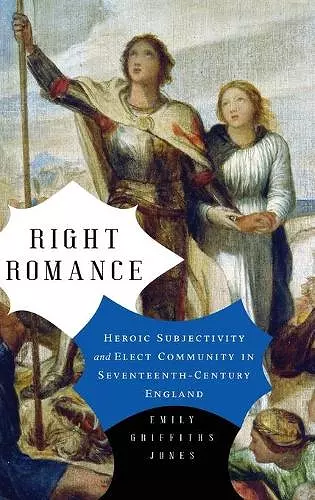Right Romance
Heroic Subjectivity and Elect Community in Seventeenth-Century England
Format:Hardback
Publisher:Pennsylvania State University Press
Published:13th Nov '19
Currently unavailable, and unfortunately no date known when it will be back
This hardback is available in another edition too:
- Paperback£33.95(9780271088099)

In this book, Emily Griffiths Jones examines the intersections of romance, religion, and politics in England between 1588 and 1688 to show how writers during this politically turbulent time used the genre of romance to construct diverse ideological communities for themselves.
Right Romance argues for a recontextualized understanding of romance as a multigeneric narrative structure or strategy rather than a prose genre and rejects the common assumption that romance was a short-lived mode most commonly associated with royalist politics. Puritan republicans likewise found in romance strength, solace, and grounds for political resistance. Two key works that profoundly influenced seventeenth-century approaches to romance are Philip Sidney’s New Arcadia and Edmund Spenser’s The Faerie Queene, which grappled with romance’s civic potential and its limits for a newly Protestant state. Jones examines how these works influenced writings by royalists and republicans during and after the English Civil War. Remaining chapters pair writers from both sides of the war in order to illuminate the ongoing ideological struggles over romance. John Milton is analyzed alongside Margaret Cavendish and Percy Herbert, and Lucy Hutchinson alongside John Dryden. In the final chapter, Jones studies texts by John Bunyan and Aphra Behn that are known for their resistance to generic categorization in an attempt to rethink romance’s relationship to election, community, gender, and generic form.
Original and persuasive, Right Romance advances theoretical discussion about romance, pushing beyond the limits of the genre to discover its impact on constructions of national, communal, and personal identity.
“Right Romance will change how critics understand seventeenth-century English romance and its political investments. It challenges long-held opinions about canonical writers such as John Milton and brings into the conversation lesser-known pamphlets and the voices of early modern women writers. The book stresses the power of romance to nourish identity—whether personal, religious, Royalist, or Puritan—and to foster heroic narratives amongst newly elect communities despite national crisis, division, disappointment, suffering, and wandering.”
—Tiffany Jo Werth, author of The Fabulous Dark Cloister: Romance in England After the Reformation
ISBN: 9780271084923
Dimensions: 229mm x 152mm x 25mm
Weight: 145g
288 pages